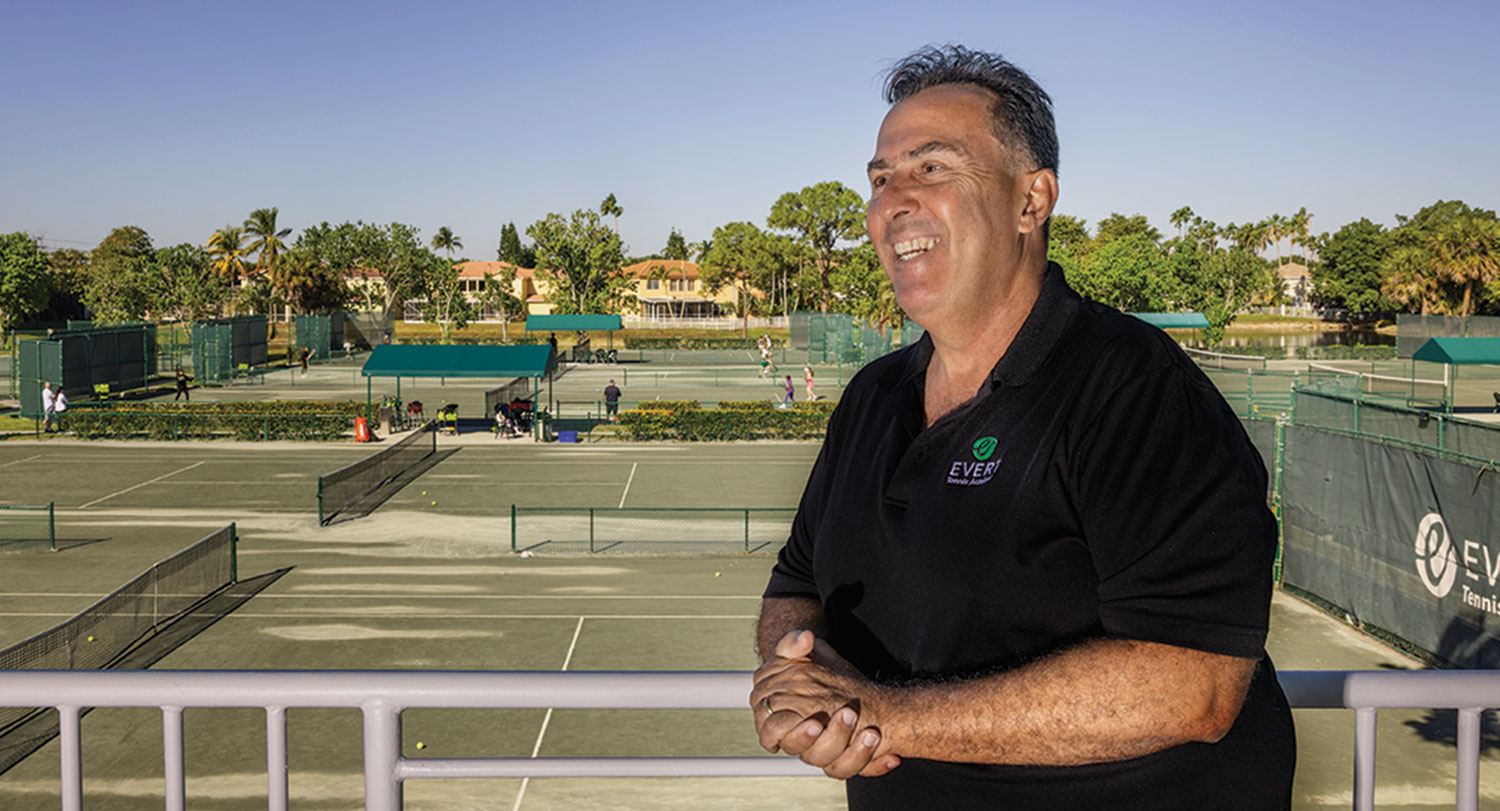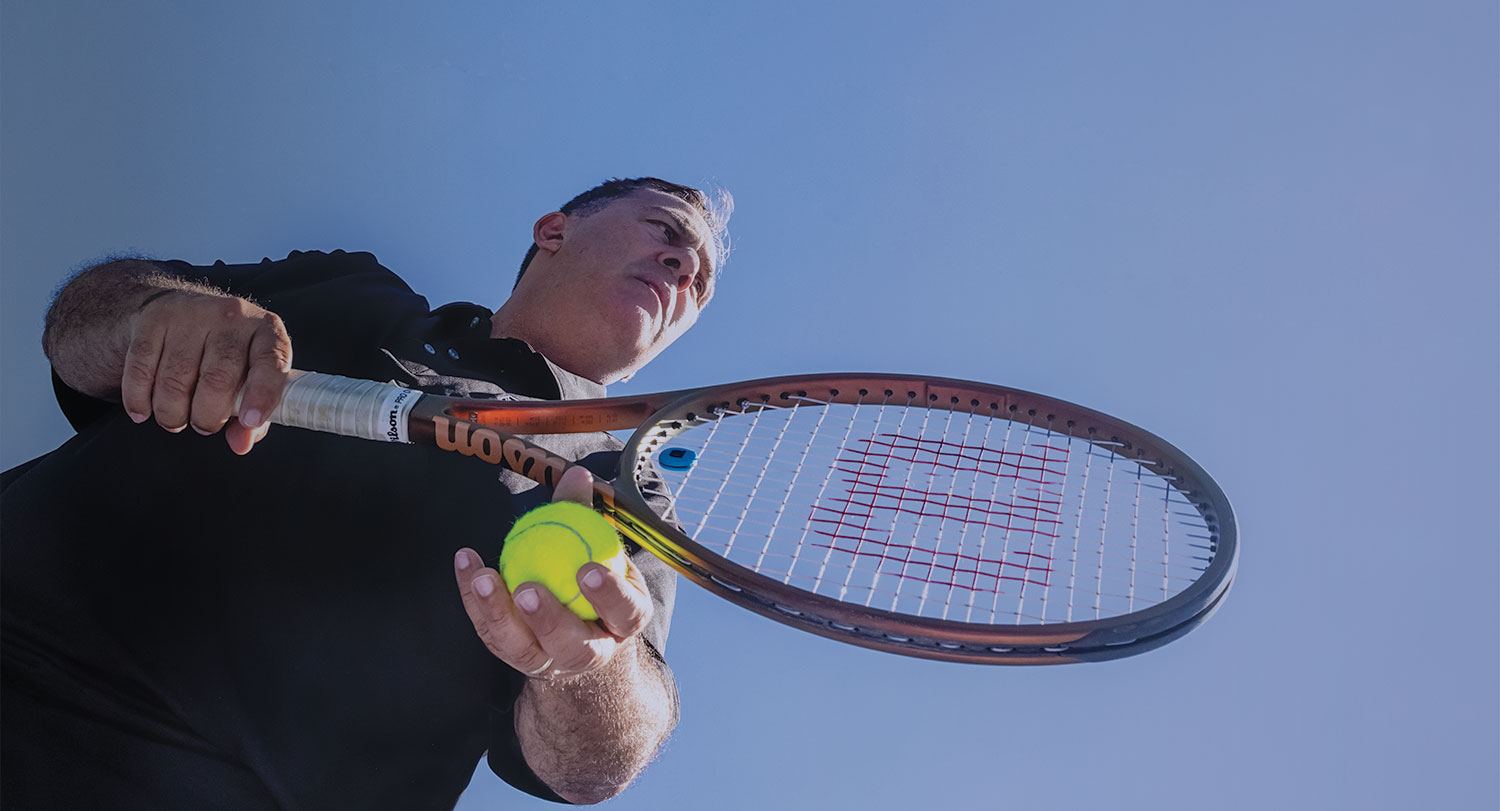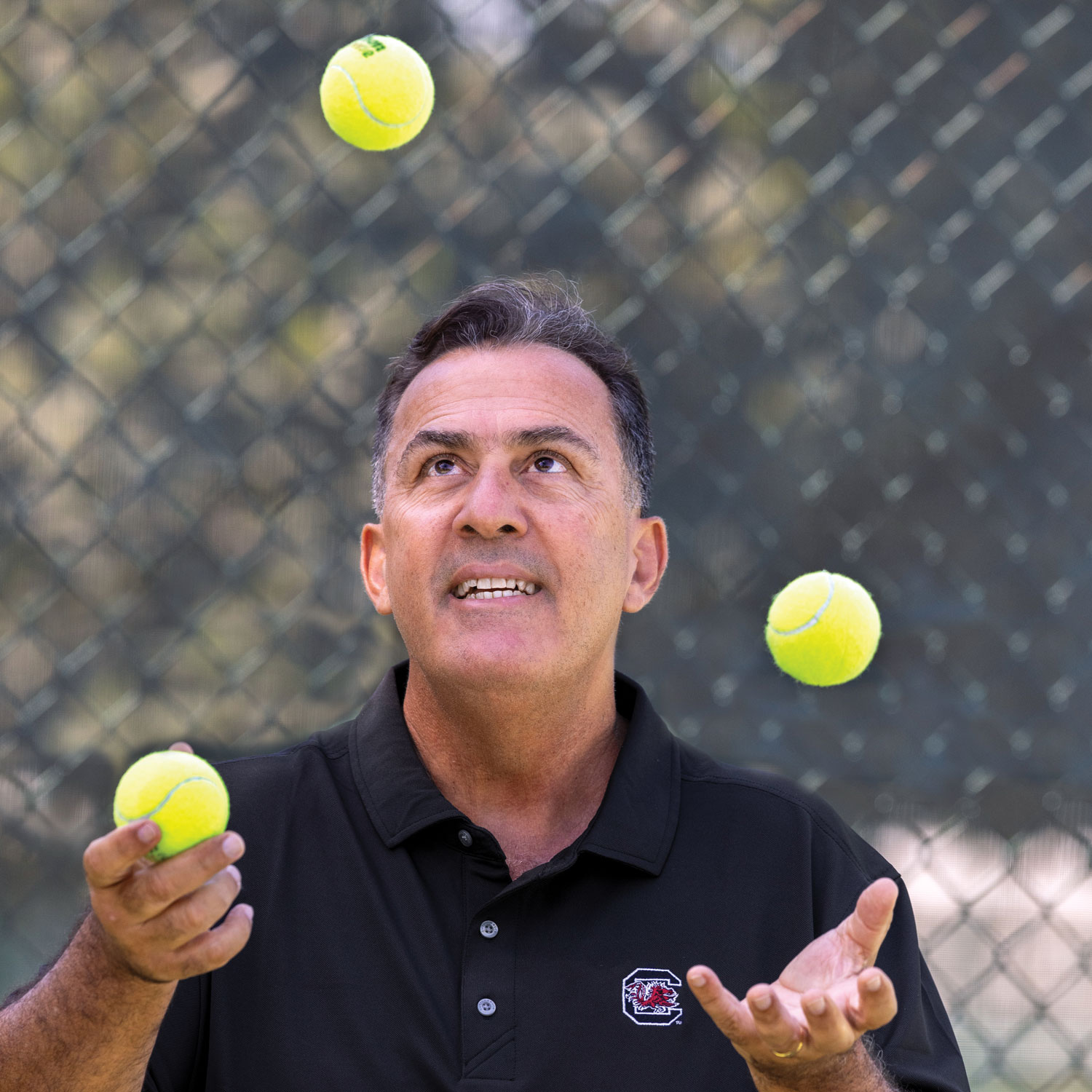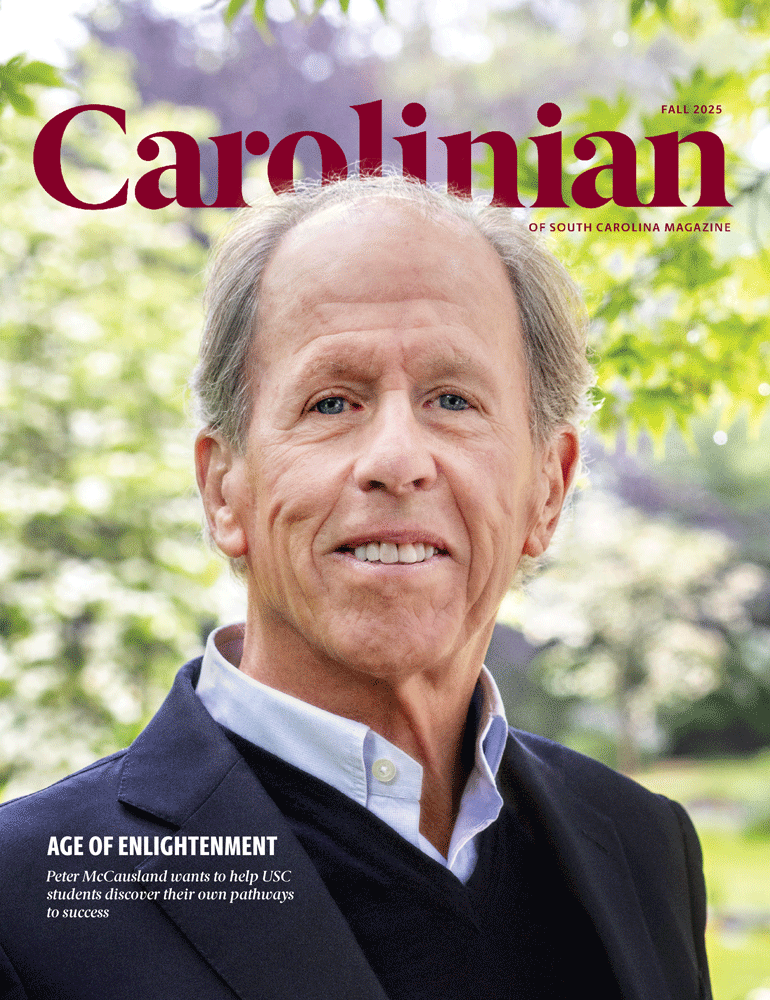Visit the Evert Tennis Academy in Boca Raton, Florida, and you’ll cut between a dozen hard courts and 11 more clay playing surfaces on your way to the clubhouse and pro shop. Inside, you’ll pass huge images of academy founders John and Chris Evert. Here, coaches and players review match film. Staff members keep things running smoothly. And Ricardo Acioly is at the epicenter of the bustling tennis academy.
He looks at home behind his desk. Acioly’s college diploma, a classic wooden tennis racquet and a team picture of the 1984-85 Gamecocks men’s tennis team hang on the wall. The former phenom from Brazil has come a long way since he dominated the courts at USC, but his alma mater is always right there behind him.
Back in Brazil, Acioly’s mother and father played tennis competitively. So did his older brother, Claudio. “I say I’ve been playing my whole life because my mother kept competing until she was about eight months pregnant with me and finally had to stop,” says Acioly.
By the time he was a teenager, Acioly was competing in tournaments around Brazil. But his first trip to the United States was eye-opening.
“The Orange Bowl is still the biggest junior tournament in the world, especially for ages 16 and below. It’s like the world championships,” Acioly says. On the biggest stage available, he made the finals. “All of a sudden, I’m one of the best juniors in the world.”
Back then, in Brazil, if you wanted to play tennis, you didn’t pursue a college degree — you played tennis. Acioly wanted both. On the advice of Claudio, who had been to the U.S. as an exchange student in New Mexico, the younger Acioly came over to finish his last semester of high school at Sandia High School in Albuquerque and then enrolled at a junior college in Tyler, Texas.
Acioly, just 16, stuck out a tough first month before hitting his stride. He was determined to chase his dream, even on a new continent while learning a new language. At season’s end, he won national junior college titles in singles and doubles.
But José Salibi Neto, a family friend and the first Brazilian to play tennis for the University of South Carolina, had other ideas for Acioly: What was he doing playing for a junior college? He needed to come to USC. In fact, he needed to visit that weekend. The Gamecocks were playing Clemson. In Columbia. That meant nothing to Acioly then, but it would.
“I didn’t know anything about South Carolina. This is before the internet,” says Acioly. “But I was fascinated with the atmosphere, the rivalry was unreal, and Coach Ron Smarr was really nice. And then José was there, too, going to grad school.”
Acioly chose USC over offers from Oklahoma State, Pepperdine and Stanford, and other Brazilians followed. All told, at least 14 Brazilian men — plus a few women, including Ingrid Gamarra Martins, whom Acioly coached — have donned the garnet and black.
Even Josh Goffi is in the mix. The current Gamecock men’s tennis coach grew up in Seabrook Island, South Carolina, but was born in Sao Paulo, Brazil. It was Goffi’s father, Carlos, who first encouraged Neto to check out USC.
“Pipelines in recruiting were much more evident back then. It was very hard to know where to go and how to recruit people,” Goffi says. “If you landed a great recruit, and you were able to help them develop, and they had a great time, they would go back home in the summer and say, ‘It’s amazing. You guys need to come, too!’”
Acioly had big goals when he arrived at USC, and in no time, he was serving up aces on the court and in the classroom. In the 1983-84 season, he and Richard Ashby led the Gamecocks with 22 doubles wins; in 1984-85, the team won the Metro Conference tournament. Meanwhile, Acioly pursued a double major in systems analysis and marketing.
Adding marketing as a second major “made a huge difference in my life because it opened up the door to other things,” he says. “Since I wanted to know about technology and computers, these majors gave me a base to do the things I do today.”
A knee injury shortened his college career, but Acioly rehabbed while he finished his degree. He was offered a job with a brokerage firm after graduation but pushed it off, and pushed it off again, then finally turned it down. His knee felt better, and he was playing competitively in Europe. He was hitting his stride.
He would stay on the ATP Tour for eight years. Acioly also competed for Brazil in the Davis Cup and represented his country in Seoul, South Korea, at the 1988 Summer Olympics. He kept a demanding schedule at a time when players didn’t travel with an entourage of coaches and assistants, but he leaned into the skills he honed in college.
“It’s a very intense experience being an athlete, having the self-control to train, to be organized,” Acioly says. “Learning to be structured in school made a difference for me and made me more stable on tour.”
By the end of the 1992 season, Acioly was still in the Top 100 in doubles, but he was no longer playing singles. “And just playing doubles was not fulfilling,” he says. That’s when the phone rang. It was Gabriela Sabatini’s manager.
“I wasn’t a coach at the time,” he says. “I knew Gabriela. We had a good relationship, and she was being coached by a friend of mine, Carlos Kirmayr, in Brazil.” Next thing he knew, he was on a plane, heading to coach Sabatini at the Australian Open.
The gig got him noticed. Soon, Acioly was named captain of Brazil’s Davis Cup team, and he coached the Brazilian team in the 2000 Summer Olympics in Sydney, Australia. He also represented players on the ATP Player Council and later served on the first coach committee for the ATP. Acioly served for many years on the ATP Board of Directors, the highest decision-making board in men's professional tennis. He is the only South American to have done so.
In 2002 and ’03, Acioly was coaching Marcelo Rios, at one time the world’s No. 1 player. It turned out to be a blessing and a curse. “That was also a high-profile job for me,” Acioly says. “All the top guys in the world started reaching out to me, and I said, ‘If I continue this, I’m going to be on tour forever.’”
Adding marketing as a second major “made a huge difference in my life because it opened up the door to other things. Since I wanted to know about technology and computers, these majors gave me a base to do the things I do today.”
He wanted to keep coaching, but he and his wife, Daniela, also wanted to start a family. So, working with his contacts, he started a tennis academy for the best junior players in Brazil. Acioly still had to catch the occasional flight — Brazil’s largest network and cable company (now called Globo) convinced him to enter the broadcast booth, and he served as a commentator at the Australian Open and all other major ATP Tour events — but the commitments were lighter, and the work offered new rewards.
“I enjoyed that a lot,” he says. “I was giving a deeper view of what was happening because I coached against a lot of the guys playing.”
He also began a role as a tournament organizer, from eight-man ATP Champions Tour tournaments with former Top 10 players and Grand Slam winners to ATP Challenger Tour events.
Julia and Lucca Acioly have grown up, like their father, in a tennis household. They played at their dad’s academy, though Acioly purposely let other coaches guide their development. As they got older and began competing around Brazil, Dad found himself thinking about their futures in tennis — and about returning to the U.S.

He already had a relationship with the Evert Tennis Academy — “I would send players from my academy to theirs when they wanted to experience training abroad,” he says — so in 2017, he brought his family to experience a full month of training at ETA.
Julia and Lucca ended up loving the tryout and began training at the academy full time a few months later. Dad came onboard, too. Initially, he split his time between Boca Raton and Brazil, but as his role expanded at ETA, Florida began to feel like home, especially with his kids training on the courts just outside his office.
“In the beginning of the transition, I was going back and forth between Brazil and the U.S. like 10 times a year,” he says. “But you know, a time comes when you have to prioritize, and I wanted to be closer to my kids.”
Acioly still works in the broadcaster’s booth on occasion, and he still spends a month in Brazil each year as one of the directors on the organizing committee of the Rio Open, the biggest professional tournament in South America. This year he also started writing a monthly column for a major sports publication in Brazil. But he spends most of his time in Florida at the bustling year-round tennis academy.
As director of strategic development who oversees marketing and sales and an expert in systems analysis, Acioly has touched almost every process and aspect of the academy over the past eight years. He also gets to impact the lives not just of young players but of junior colleagues like Mateo Garces, a sales manager who is pursuing his MBA in sport management at nearby Florida Atlantic University.
“He’s very knowledgeable because of his experience and background,” Garces says. “Coaches look up to him. Students and families look to him for advice. And with the rest of the office team, he’s very easy to communicate with and is just a very cool person to work with. He’s been a great mentor because he gives room for my own initiative and creativity.”


